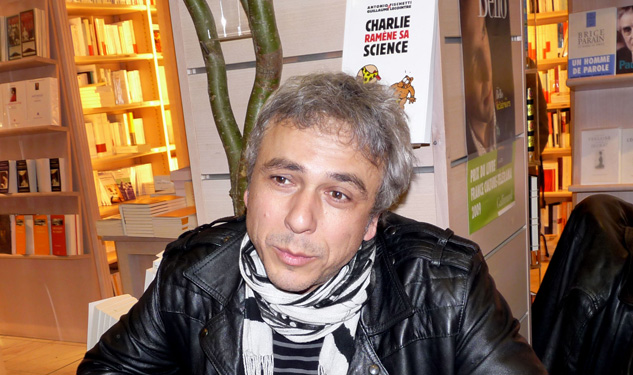
- Industry
We Did Not Want To Be Heroes
On January 7, 2015 Charlie Hebdo journalist Antonio Fischetti survived the terror attack on his magazine, as he explains, “only because I attended the funeral of my aunt.” His voice still trembles when he speaks about the horrific attack in which terrorists stormed the weekly’s office in Paris killing 12 of his colleagues and friends. Like most of the staff at that time, Fischetti is a veteran at the satirical French magazine. Charlie Hebdo was founded in 1970, and he joined in 1997, running his own column since then. The 54-year-old journalist recently traveled to Hollywood to accept the Daniel Pearl Award for Courage and Integrity in Journalism on behalf of his publication for the bravery in confronting a tragedy of unimaginable proportions which moved the world to solidarity. In our exclusive interview, Fischetti discusses the challenges the weekly magazine has faced since the terror attack. How would you define courage and integrity?
Antonio Fischetti: Firstly, let me say that none of our cartoonists or writers who died in the terror attack tried to be heroes. It is not our goal to be heroes. My colleagues simply were passionate journalists and cartoonists; they loved their job. Unfortunately, since the attack our job has become a dangerous one. But we refuse to be intimidated. Maybe this is courageous but to us, it is essential to continue our work as journalists and cartoonists. Our work is our contribution to society and democracy. We also owe it to other journalists around the world who face hardships in their daily work. Courage means determination and we won’t give up.
What has changed for Charlie Hebdo since January 7, 2015?
Antonio Fischetti: One of the difficulties we faced was that the best cartoonists in the world were killed. It is very difficult to recruit new ones because their drawings do not comply with our quality or style. It will require years to train young cartoonists. The loss of our staff and subsequent recruiting put us in a strange transition phase.
Which new challenges does Charlie Hebdo face today?
Antonio Fischetti: As I mentioned earlier the staff is still our biggest challenge. We are currently a team of 20 people, 5 to 7 administrators, the same amount of writers and the rest is cartoonists. Our weekly circulation increased from 30,000 before the attack to 400,000 since the attack. This is a huge challenge for a small operation like ours. But not only the logistic is a challenge, we also have a new audience. Most of the new readers had not heard of Charlie Hebdo before January 2015. The worldwide attention is new to us and also contributes to the transition. This leads to the question of how do we keep them interested in our newspaper without loosing our philosophy. There is a lot of pressure on us. Careful changes will have to be made at the same time the main objectives of Charlie Hebdo will remain untouched. In my opinion as journalists we cannot think too much about the pressure otherwise we block ourselves. The key to success is to stay strong and produce the best work we can and hope that the readers around the world will stay with us week after week.
Which effect do you feel from the support of the international community?
Antonio Fischetti: Before the attack we often felt alone and we faced backlashes even within France. We were reproached for exaggerating terrorists and critiqued for the Muhammad cartoons. In the past we explained that caricature is an art form, that it is important to maintain freedom of expression and free speech as an integral part of our democracy. If we give in, democracy is in danger. The international support was overwhelming and we felt we are not alone. Also, the support of Hollywood stars sent a positive message to fight for our democratic right of free speech.
Which Hollywood stars would you like to meet?
Antonio Fischetti: Honestly this question is difficult to answer because I would be so star struck. I would be like a little boy not knowing what to say. But if I could meet someone, it would be George Clooney.
Barbara Gasser